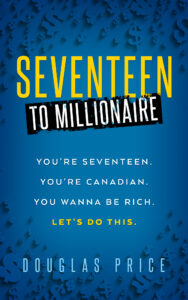Doug believes any seventeen-year-old can become a millionaire.
At Gifting Sense, we are big fans of granular, step-by-step instructions on how to get something done. It’s all good and well to talk about big ideas, but most real progress toward a goal comes from a series of small but important steps. Small steps are easier to understand and easier to make, so they tend to get taken. Before you know it, ten small decisions add up to one big accomplishment.
This is the beauty of the book “Seventeen to Millionaire”. Douglas Price believes that any 17-year-old Canadian can become a millionaire in their lifetime if they consistently commit to a series of small but important decisions from the end of high school forward. When you read his book, you start to believe him.
His keen ear allowed him to observe how.
Doug isn’t a parent himself but has been a teacher for years, notably at the National Theatre School of Canada. A musician and composer (and master’s graduate of the Royal Conservatoire of Scotland), he has a keen ear. This allowed him to observe that parents who don’t feel like money experts can hesitate to talk to their kids about household or personal finances. But as an educator, Doug also knows the power of good habits developed when young. So, his book encourages 17-year-old students to be brave and sensitively ask their parents questions about money. He also encourages parents to lean into the power of their own youthful wins or mishaps to teach their kids some valuable lessons. As any parent will tell you, it’s when your kids ask you about something personal that they may be most interested in hearing from you. Otherwise…

He encourages his readers to ask questions instead of making costly assumptions.
Readers familiar with Fred Selinger’s “The Missing Link: From College to Career and Beyond” will recognize our praise of granular instruction. “Seventeen to Millionaire” is a more youthful and therefore slightly less technical read than “The Missing Link”. However, it contains many of the same clear explanations for financial terms (banks versus brokerages, compound interest, dollar-cost-averaging) and acronyms (RRSP, TFSA, ETFs). And the same sort of powerful narratives around why understanding and using tax-advantaged or employer-sponsored savings tools as early as possible literally sets the stage for a life filled with financial peace of mind – versus worry.
Our favorite: the story about someone (not Doug, you understand…) who turned down a pay raise because they thought it would bump their entire income into the next tax bracket. Can you think of a better advertisement for why getting comfortable with asking questions about money matters?
The Canadian “Missing Link”
We need to mention that “Seventeen to Millionaire” is a book written for young people living in Canada. Canadians who have read Mr. Selinger’s book have commented about its exclusive use of American payroll deductions, accounts, tools, terms, and acronyms. So, Thank You, Doug, for filling that hole!
Doug couldn’t find a book about money that appealed to his 17-year-old self when he was in high school. So he wrote one for today’s students. It’s easy to read and filled with steps your teenager can take in the moments after they’ve read a chapter. Investing is the most popular personal finance topic, but it ranks behind basic money management in importance. You have to be able to afford to invest! All to say, investing in “17-To-Millionaire” just might be the easiest way to set your teenagers up to build investable surpluses – and then employ them in the most effective way possible.
Of course, if you have middle school students at home, the easiest way to get them started on a journey towards financial peace of mind is to have them practice thinking before buying when making various age-appropriate purchases. Your family can use our tools to practice thinking before buying or develop their own.
To learn more, click on the pink or blue buttons below.
For Parents For Teachers Inspiring Financial Writers



